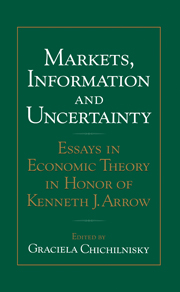Book contents
- Frontmatter
- Contents
- Preface
- List of contributors
- Section I Information and markets
- Section II Uncertainty and finance
- Section III Market externalities and justice
- 8 Moral hazard and independent income in a modern intertemporal-equilibrium model of involuntary unemployment and mandatory retirement
- 9 On the optimal schedule for introducing a new technology, when there is learning by doing
- 10 Price and market share dynamics in network industries
- 11 Exchange in a network of trading posts
- 12 Equilibrium market formation causes missing markets
- 13 Toward a general theory of social overhead capital
- 14 On population externalities and the social rate of discount
- 15 Trade and Welfare
- 16 History as a widespread externality in some Arrow–Debreu market games
- 17 Redistribution by a representative democracy and distributive justice under uncertainty
- Author index
- Subject index
14 - On population externalities and the social rate of discount
Published online by Cambridge University Press: 05 December 2011
- Frontmatter
- Contents
- Preface
- List of contributors
- Section I Information and markets
- Section II Uncertainty and finance
- Section III Market externalities and justice
- 8 Moral hazard and independent income in a modern intertemporal-equilibrium model of involuntary unemployment and mandatory retirement
- 9 On the optimal schedule for introducing a new technology, when there is learning by doing
- 10 Price and market share dynamics in network industries
- 11 Exchange in a network of trading posts
- 12 Equilibrium market formation causes missing markets
- 13 Toward a general theory of social overhead capital
- 14 On population externalities and the social rate of discount
- 15 Trade and Welfare
- 16 History as a widespread externality in some Arrow–Debreu market games
- 17 Redistribution by a representative democracy and distributive justice under uncertainty
- Author index
- Subject index
Summary
The social rate of discount plays a central role in applied welfare economics, governing such decisions as the amount of public investment, interventions in private capital markets, and the size of intergenerational transfers. Ever since the social choice theory literature began to evolve into practical models of government planning, there has been a lively discussion concerning the appropriate social rate and reasons why it should or should not deviate from the private (market) rate. Kenneth Arrow was an early and frequent contributor to this literature along with many others; on the occasion of Arrow's Festschrift, I attempted to summarize a number of elements in the debate. Since that time, the subject seems to have receded somewhat from prominence, the prevailing opinion being that value judgments must ultimately be invoked and that economic theory cannot resolve such matters.
I would like to take this opportunity to reopen the subject, not because I think there is anything really new to say about the underlying value judgments, but because this is a context in which these judgments can be illuminated most starkly. I address the issue of population crowding and the appropriate way to measure its social costs.
The literature identifies one crowding externality in particular as being important to the population question: the “global commons.” To the extent that access to such common resources is essential to wellbeing, an extra person imposes external costs by crowding other people out. By way of introduction, we provide a general set-up for measuring this externality and argue that if the global commons were interpreted broadly to include all the earth's fixed factors, the associated external cost of an extra person would be quite substantial.
- Type
- Chapter
- Information
- Markets, Information and UncertaintyEssays in Economic Theory in Honor of Kenneth J. Arrow, pp. 305 - 321Publisher: Cambridge University PressPrint publication year: 1999



